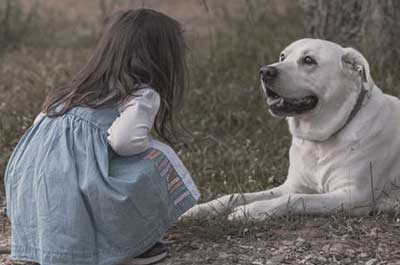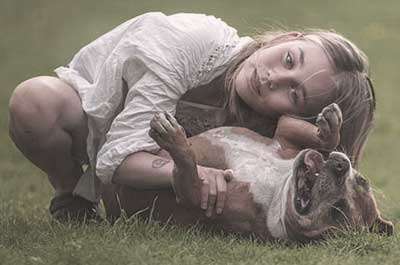Many young children are excited by the idea of owning a dog, but not every dog breed is appropriate for families with kids. When choosing the best dog breed for children, it’s important to consider several factors to ensure a safe and happy match. This article explores how to select the most suitable dog breeds for kids and provides helpful information on what to expect when bringing a new canine companion into your child’s life.
Factors to Consider in Dogs for Kids
What are the best dog breeds for children? Well, some are better suited to them than others. It’s essential to consider many factors when deciding which type of dog is right for your kids. Some of the most important are listed below.
First and foremost, what is the child’s age?
Many people believe that large dog breeds are ideal for families with children, but this is a common misconception. While breeds like the St. Bernard or Great Dane might appear to be the perfect companions for young kids, their sheer size can accidentally cause injury during play. For families with children, it is better to consider medium-sized dog breeds with gentle temperaments and soft mouths. Medium-sized dogs are generally more suitable for young children, especially those who are still developing their motor skills, making them a safer and more family-friendly choice.
The dog’s life expectancy is also relevant.
If you want your children to spend several years with their new pet, choose a breed that will live long enough to be around for years of playtime.
Most large dog breeds, such as Mastiffs and Great Danes, typically have shorter life expectancies compared to smaller dogs. Medium-sized dog breeds generally enjoy longer lifespans, often living between 12 and 15 years. Smaller dog breeds, including Pugs and Chihuahuas, frequently live well into their teen years, making them some of the longest-living dogs.
Activity level.

Certain dog breeds need a substantial amount of daily exercise to stay healthy and happy, while other breeds are more laid-back and enjoy relaxing or lounging on the couch with their families all day.
Your child’s schedule should be taken into account, as well. If your child does not have the time to train and exercise the dog daily, you may want to consider choosing a breed that requires less activity.
Dog breeds with special needs.
Some dog breeds have special needs that must be considered when choosing a breed for your child. These requirements often include:
- Special dietary needs – Breeds with short muzzles, such as Pugs and Bulldogs, need to eat special diets low in fat to avoid health problems. Also, the type of food you give your dog will impact its health. Check this book before bringing a dog to your home: Real Food for Dogs.
- Special grooming needs – Shih Tzus, for example, shed profusely all year round. If you want your child to be involved in the dog’s daily grooming regimen, this breed is not the best choice. Due to their long coats, Komondor breeds need hours of brushing per week and require frequent haircuts. You will probably be able to let your poodle grow long hair without ever having to sweep it or take it in for a haircut. These dogs are hypoallergenic, so they are ideal for families with children who suffer from allergies.
- Special medical needs – Dogs with short legs, such as Basset Hounds and Corgis, require special care, including regular back checks to avoid spinal injuries. Brachycephalic breeds, including Pugs and Bulldogs, have difficulty breathing in certain circumstances. I don’t recommend these breeds for young children who may accidentally restrict the dog’s airway with their hands or blankets.
- Training needs – Training is a fundamental part of owning any dog, especially if you have children. It’s not enough to teach your child how to interact with the dog – you must be sure that your furry friend knows how to respond appropriately. If you are considering purchasing a breed that requires more training than others, however, make sure your child will be compliant and practice the training daily.
Dog temperament.
Finding a dog breed with an even-tempered personality is essential if you want your child to play with the dog safely without fear of being injured.
- For example, some breeds, such as German Shepherds, bark at everything they see, including children playing in the yard.
- Although some breeds are more tolerant of children than others, no dog should be left unattended with a child unless the adults in the home are confident that the dog and child can interact safely with one another.
- No dog breed is 100% safe with children, but some breeds are more tolerant and more accessible to train than others.
Children with special needs or disabilities.
If you have a child with special needs or disabilities, such as autism or Down Syndrome, choosing an appropriate dog breed is especially important.
- Some breeds are more tolerant of certain behaviors than others. For example, if your child can accidentally hurt the dog while trying to hug it, she may be better off with a smaller breed that doesn’t mind being squeezed. For example, Chihuahuas are known for their tolerance of children.
- People who require medical attention or take medications that cause drowsiness should avoid dog breeds that aggravate the situation, such as those with high energy.
- Newborn puppies should be very well-socialized to prevent biting or nipping, which can injure a child’s delicate skin.
- However, you should consider that long hair breeds are more likely to get tangled in little fingers than shorthaired breeds. Smaller breeds may be overwhelmed by energetic toddlers who want to play constantly.
Adoptability.
Can you easily find this type of dog in your area? Are they popular? Depending on where you live, it may be more challenging to locate some breeds than others.
However, if you’re willing to adopt a dog, rescue agencies are filled with all types of breeds that need good homes.
Is the family ready for a pet?
Do you have enough time to spend with another member of your household? Pets require attention, love, and proper care. They also need to exercise every day. If you don’t have enough time or energy to devote to yet another living being in your household, look into other options before jumping right into taking care of a dog full-time.
Can your family afford the financial responsibilities involved with owning a pet?
There are many costs associated with caring for a puppy, including veterinary bills, food expenses, grooming supplies (if applicable), toys, leashes/collar/ID tags, and more. If your family lives on a tight budget, this may not be the right time to adopt a dog.
Does your family have the proper living arrangements to support a dog?
Regardless of whether you live in an apartment, house, or somewhere else entirely – it’s vital to ensure that your place of residence is dog-friendly. If you can’t give your dog plenty of exercise space, don’t adopt one just yet.
Animals are living creatures that need love and care, just like children do. Before deciding which breed would be best for YOUR family, consider each of these factors carefully!
What breeds make good watchdogs?
So what breeds make the best watchdogs? That’s a question you should ask yourself before committing to a dog. If you’re looking forward to having a dog patrol your property, for example, you may want to consider naturally protective breeds.
Some dogs that fall into this category include Akbash Dogs, Anatolian Shepherds, Greater Swiss Mountain Dogs, and Komondors. These large breeds were initially used to protect livestock from predators such as coyotes and bears.
They have the size and strength necessary to fend off intruders who might be bold enough to attempt breaking into your home or yard. On top of deterring people, these larger breeds also have a powerful sense of smell, which makes them ideal for sniffing out potentially dangerous substances near your children before putting their little bodies at risk.
The downside, however, is that these types of dogs are not always the best choice for first-time dog owners, mainly because they can sometimes be tough to handle.
Are there certain situations where it’s better to avoid adopting a particular breed of dog?
It depends on the child and how well they will take care of this animal. Dogs are family members too, but if your child is going through an emotional crisis or doesn’t know how to treat something properly – it’s probably best that you wait until things improve in their life before bringing a dog into the picture.
If you need to start by considering breeds that are most adaptable and most easily trained, go for a smaller breed that isn’t going to be intimidated by your child’s shrill voice or fragile emotional state. You want to ensure that your dog will be in good hands when you’re not available to take care of them yourself.
When do you need to start obedience training with a new dog?
Obedience training is essential and needs to begin as soon as possible.
Your furry friend should be trained in basic commands such as “sit,” “stay,” “heel,” and many others. This will help ensure they understand what’s expected of them when they’re either indoors or outside on your property. You don’t want to end up with a disobedient, unruly animal who doesn’t listen to anything that comes out of your mouth!
It may be too late if you decide to wait several months before teaching your dog any commands. They may have already developed some bad habits that will be difficult for them to break.
Before deciding on the breed, I recommend you take training courses so you will know how to train your dog from the start, and also, you can decide which breed will be easier to train.
How often do you need to clean your dog’s ears?
Clean ears are important – they help dogs hear better, which is why you must take good care of them. You should be cleaning your pet’s ears daily if possible – more frequently during days when there are lots of pollen in the air or when your animal is experiencing any health issue. You also want to make sure that dirt and debris don’t accumulate inside the ear while running around outside. If left untreated, some infections can become very serious. You don’t want to put your dog through any unnecessary pain, so you should start cleaning his/her ears on a regular basis starting the first day.
What is the best breed of dog for first-time owners?

In my opinion, it doesn’t matter what type of breed they choose because, in reality – all dogs have their own unique set of personality traits, likes/dislikes, strengths, weaknesses, etc. If you’re just starting as a new owner and aren’t exactly sure how this whole taking care of an animal thing works – I would recommend getting a small-sized dog such as a Chihuahua or Shih Tzu.
I don’t recommend getting a dog that’s too big – especially if your child is very young and doesn’t know how to handle a large animal properly. These breeds are also not ideal because they can often be quite intimidating, making it harder for children to establish a proper bond with them.
What breed of dog works best if you have a cat?
Any breed will work, but I would recommend going with a retriever or a poodle. Retrievers were originally bred in England to retrieve birds after hunters shot them down. They’re naturally kind and gentle animals who don’t mind sharing their space with other pets, such as cats, guinea pigs, etc. Poodles, on the other hand, are intelligent and easy to train. They are very friendly by nature, but they can sometimes be wary of other animals depending on their socialization as puppies.
What breed of dog do you recommend for a family that lives in the city?
Many breeds will work fine, but it’s best to go with something medium-sized such as a Maltese or Bulldog. These types of dogs love having fun, and they’re great at adapting to any environment, provided there is enough room for them to explore and play outdoors.
Other breeds that do well in small spaces are Pomeranian, Beagle, or Jack Russell Terrier. These pups love to play, and they’re usually very energetic, which means they will want to run around outdoors whenever possible. If you have a larger dog, it’s going to be difficult for them to get enough exercise while living in a tiny home or studio apartment – so keep this in mind when making your choice.
Which breed is best if you often travel with your pet?

Any breed will do, but it’s usually easier to accommodate dogs that don’t mind spending time in small spaces (such as crates). Small breeds like Yorkies or Pomeranians can be placed inside their compartments without any problem.
Retrievers are great pets to have if you frequently travel because they love spending time in their crates. These dogs are intelligent and highly adaptable, so it’s easy for them to get used to being inside a box.
Other small-sized breeds that do well when cooped up inside a crate include Maltese, Poodle, and Shih Tzu. These dogs are perfect for people who regularly travel because they’re not known for being barkers, which means they won’t strain their vocal cords after long periods in a small space.
What breed of dog do you recommend if the family is big on hiking and camping?
Any medium to large-sized dog should work fine. The only thing you need to consider is whether or not your pet has a lot of energy because it can be difficult for them to get enough exercise while living in an apartment. Suppose your pup doesn’t get enough exercise. In that case, this could lead to excessive barking and other behavioral problems such as chewing and digging – so make sure you choose a breed that’s very active and loves spending time outdoors (such as Retriever, Siberian Husky, German Shepherd, etc.).
Conclusion.
Kids are usually full of energy, so all dogs must get enough exercise. Otherwise, they can become emotionally unbalanced and even act out in some cases (which might lead them to bite your child).
Age plays an integral part in pet owner/animal compatibility, too, because if children are very young – it might be hard for them to appropriately interact with a large dog with lots of pent-up energy. On the other hand, older children or teens can keep up with small breeds with plenty of peps in their steps.
We hope that these 10 tips will help you make an informed decision about which dog breeds are best for your family. If you have any questions, please leave them in the comments section below!

Meet Brenda Tillman: your go-to expert in Cognitive Behavioral Therapy! Not only is she a seasoned therapist, but she’s also a passionate mom blogger who never misses a beat. Dive deep into her insightful blogs, backed by her extensive coursework in Parenting Skills, Learning, and Education. Brenda’s heartwarming family – a son, two daughters, and their adorable pets – often take center stage in her writings. From parenting hacks and relationship tips to health & fitness nuggets, Brenda has been enlightening her readers for over half a decade. Stick around, and you’re bound to discover gems from a mom who wears many hats with grace!
Reviewed By: Joanna Perez and Marcella Raskin
Edited By: Lenny Terra
Fact Checked By: Gabrielle J. Smith
Photos Taken or Curated By: Matthew Mansour